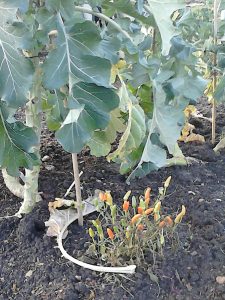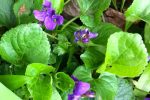Maintaining soil and structures and planning ahead
- Prepare for early vegetable crops by warming soil before sowing, covering seedbeds with polythene or cloches.
- Keep off wet soils to avoid compaction. Use long boards as walkways, to spread your weight.
- If the soil isn’t too wet, start to dig in overwintered green manures (e.g. Grazing Rye, Winter Tares or Overwinter Mix sown previous August to November) as the frost should have killed them off.
- Continue to tidy up and re-cut grass path edges if the grass has encroached on your plot.
- Continue to add layers of un-composted stable manure to your heap.
- Apply 2” layer of well-rotted garden manure (Country Natural ) or garden compost around perennial crops such as Jerusalem artichokes and rhubarb.
- Club root is a fungal infection that affects the roots of brassicas and is endemic on allotment sites. To reduce the risk of infection, apply lime to the soil at 270g per sq m, 8oz per sq yd. where brassicas are to be grown. Do not add composted manure at the same time. Calcified Seaweed can be used as a natural alternative to lime, fork it in 140g per sq yard / metre about a week before planting.
- Apply general fertilizers such as Growmore, (inorganic) or fish, blood and bone or seaweed (organic). Poultry Manure pellets are a non-chemical alternative to Growmore. They are slower to release their nutrient content, some of which will not become available until the soil warms up.
- Organic Rock Dust and Bio Char soil improvers replace minerals in the soil lost to leaching..
- Top-dress all tree and soft fruit with sulphate of potash.
- Clean pots and trays by scrubbing in hot, soapy water before starting to sow new seeds. Pests and diseases can overwinter in old potting compost, surviving to damage newly emerging seedlings.
- Prepare a new asparagus bed by digging in well-rotted manure and order asparagus crowns
Sowing and growing
- Chit potato tubers in a light, cool, frost- free place.
- Outdoors, sow broad beans, spring garlic, peas and Jerusalem artichokes.
- If mild, also sow spinach outdoors.
- Sow sweet peas under cover in deep pots or Root-trainers.
- Pot on and pinch out autumn-sown sweet peas to encourage side-shoots to form View on Gardener’s World
- At the end of the month sow tomatoes under cover.
- Sow sweet and chilli peppers from mid February in a heated propagator or sunny windowsill. (Chillies need 21 degrees to germinate.)
- Sow radishes in cold frame or greenhouse beds.
- Sow aubergines in a heated propagator or sunny windowsill.
- Sow celeriac in deep modules in a heated propagator or sunny windowsill.
- Sow cabbage under cover.
- Sow early leeks in deep pots under cover.
- Sow early lettuce and keep in cold frame or greenhouse for earlier harvest.
- Sow hardy annuals for companion planting such as calendula and tagetes indoors for earlier blooms.
- Sow mustard and cress in a small seed tray on a warm windowsill for pickings in just a few weeks.
- Spray dormant fruit trees and bushes with plant oil-based winter tree wash to kill overwintering eggs of aphid pests.
- Force rhubarb for sweeter, earlier stems by covering crowns with straw and then a container, such as an upside down bucket, to exclude light.
Harvesting
- Purple sprouting broccoli and kale may be possible to harvest.
- This month, complete pruning of apple and pear trees, gooseberries, redcurrants and prune out a quarter of blackcurrants’ older growth at ground level.
- Prune autumn raspberries, cutting all canes down to the ground.
Pruning
- If summer-fruiting raspberries have grown above their supports, cut back to one or two buds above the top wire.
- After pruning, apply a general-purpose fertilizer to tree, bush and cane fruit and mulch with well-rotted manure or garden compost.
- Start pruning bush roses at the end of the month.
- Vine pruning must be completed by the middle of the month.
Gardening for Wildlife
- Continue to top up bird feeders. Avoid giving large foods, such as peanuts, as nesting time approaches.
- Put up nesting boxes.
- Avoid turning the compost heap until mid-spring as it could be sheltering hibernating frogs, small mammals and insects.



